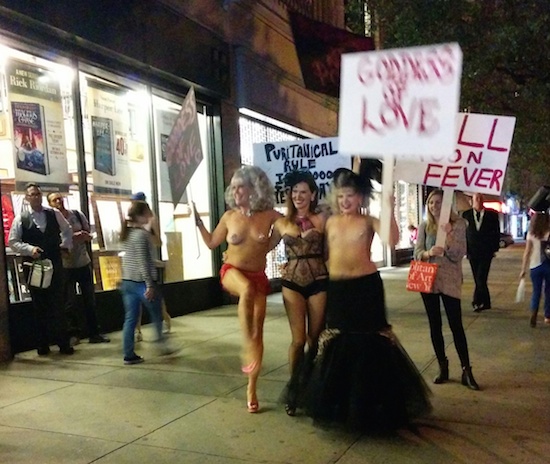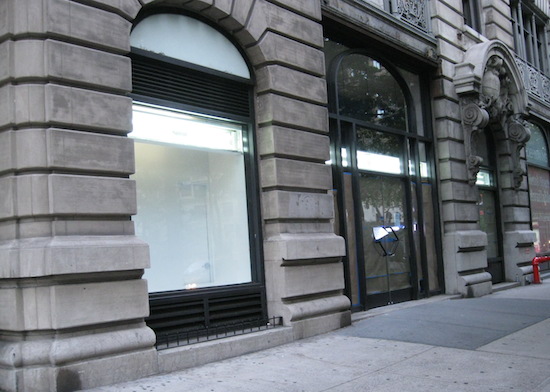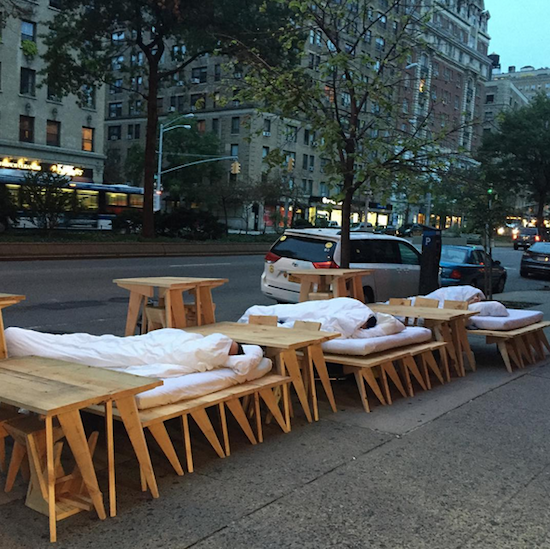We are aware that the reply button on the comment form is broken on mobile (it's ok on desktop) and we are working on fixing it ASAP! Thanks for your patience!
OPEN THREAD: HAWKS ACTING UNCIVILIZED
OPEN THREAD: HAWKS ACTING UNCIVILIZED
This site uses Akismet to reduce spam. Learn how your comment data is processed.
Is that my car?!!!!!
Nice to see Woody Allen making a film on the UWS!!
Looks like a Cooper’s hawk…I saw one once on my run in Riverside Park in the early morning. Gorgeous! So happy to see these amazing creatures! Our fierce feathered neighbors! The best!
Both of these are 1st-year juvenile red-tailed hawks They have the yellow eyes of youth and no red tail as yet.
The Riverside RT looked possessed because of those yellow eyes. Actually she seems to be looking at the lunch menu.
RTs are very low-key raptors unlike some others such as Cooper Hawks.
It is the start of migration season for young hawks so these might be tourists stopping in Manhattan to sample our renowned meaty pigeons and rats.
Love it! Such gorgeous birds and a chuckle, too.
Columbus – “A Lucky Man”
I found this delightfully humorous article on Christopher Columbus, written for The New York Times on November 3, 1877.
With his holiday approaching, I wanted to share it.
https://query.nytimes.com/mem/archive-free/pdf?res=9C07EFD8103FE63BBC4B53DFB767838C669FD
Columbus a lucky man
I’m sorry that the link does not work.
If you subscribe to the NYT, you can access it right away by typing “Columbus a Lucky Man” in your search.
So sorry.
That hawk is nothing a good drone can’t handle.
On the recent thread about the re-zoning of schools around PS 199, a commenter decided to proclaim that this was further proof of their incredibly wise decision to leave the City and move to the Suburbs. As proof, he/she used more space, a nice school, and “savings thousands of dollars per month” on housing. Leaving aside the fact that nearly all the schools on the Upper West Side are great schools, and probably far better than what most of us grew up with . . .
It’s great that adults can choose where they want to live, and there’s no shame in choosing the city, the suburbs, the ex-urbs, the countryside, or even another continent.
But I tend to think that people hold a fundamentally flawed notion of what “value” is when trying to compare different living arrangements. Instead, I like to think of it more as a “trade” – We go through this life trading a fixed amount of money, time, energy in a way that puts together an overall lifestyle.
To that end, it’s not complete to say that living in the suburbs “saves thousands of dollars per month” on housing. That may be true when comparing only a monthly rental or mortgage payment of a City dwelling only to a monthly rental or mortgage payment of a suburban dwelling. But when one thinks about “total cost of living,” are they accurately taking into account the different balance-sheet for a suburb-dweller? Does the commenter consider gasoline when they drive to the market or shopping-mall as an increased cost of living in the suburbs? Are they totalling up tolls, gas, depreciation to drive in to the City to visit AMNH and pass on highways and bridges? Was the commenter factoring in fixed costs of living in a home, such as replacing roof, boiler, plumbing every 5, 10, or 15 years into their overall housing cost? What about interior decorating for the additional space? What about the cost of the lawnmower or the landscapers? What about shoveling snow or fertilizing? What about the extra costs of flowers to keep up the garden? What about the sprinkler system? What about the increased energy bills, heating/cooling, or increased utilities to furnish this additional space? What about the costs of trains and buses?
It is true that the top-line monthly mortgage or rental cost is less the further one lives from an expensive city area. But after taking all of the additional costs of living outside the city into account, I doubt this totals the “thousands of dollars per month” that the commenter proclaims proudly. It may still be less, indeed, but that’s not the entire story.
After exhausting all debates about financial numbers and “total cost of living,” one is left with the ultimate trade-off – Time. For many, living close to one’s job is the difference between having dinner with your kids at night or just catching up with them on the weekends, or any other activity that one can do with time saved while being close to a job, grocer, shopping, or other establishments. Most people don’t put a financial cost on this, but shouldn’t we be factoring in this “opportunity cost?” Speaking of my own experience this is totally worth the extra money I pay for my “total cost of living,” and this is Time I can never get back while my Kids are young; whether I wind up becoming a billionaire or declaring bankruptcy in 10 years.
People like to “grade” city living vs suburban living vs countryside living as if one is superior to one another. They are just different. With everything, we are just trading costs, time, opportunity to create our lifestyle.
Sure, I could move to the Suburbs and save money on my housing, but I’d introduce new costs in innumerable ways. I’d also move myself further from my job and perhaps limit my flexibility to be a high achiever at the office and perhaps cripple future earning opportunities. Or, I could find a field that isn’t in New York City; and I would likely make a lot less money overall (at least in my field, I cannot speak for all fields). These hypothetical scenarios are just trades of one resource (whether it be earnings, time, opportunities) for another. Was I really so wise when I considered a college major twenty years ago to know where my occupation would be centered and how that would impact my lifestyle opportunities? Obviously not, we just make decisions one at a time and try to maximize our lifestyle along the way. It costs a lot to live in this City, but this is where my field is and I’d rather not try to take a shortcut of “working in the city, living in the suburbs” which may save me money but trades away my ultimate scarce resource – time.
I applaud the commenter for taking charge in their life and for having a lifestyle that they, their family, and their dog really like. But I definitely believe that it’s incorrect to look at an anecdotal story about school zoning, couple that with a top-line savings in housing, and proclaim one’s wisdom to have abandoned the Upper West Side and NYC altogether. Some of us may have time and flexibility higher up on our priority list than space and landscapers, and for that reason choose to allocate more of our yearly earnings to be in close proximity to our job.











Is that my car?!!!!!
Nice to see Woody Allen making a film on the UWS!!
Looks like a Cooper’s hawk…I saw one once on my run in Riverside Park in the early morning. Gorgeous! So happy to see these amazing creatures! Our fierce feathered neighbors! The best!
Both of these are 1st-year juvenile red-tailed hawks They have the yellow eyes of youth and no red tail as yet.
The Riverside RT looked possessed because of those yellow eyes. Actually she seems to be looking at the lunch menu.
RTs are very low-key raptors unlike some others such as Cooper Hawks.
It is the start of migration season for young hawks so these might be tourists stopping in Manhattan to sample our renowned meaty pigeons and rats.
well said
Love it! Such gorgeous birds and a chuckle, too.
Columbus – “A Lucky Man”
I found this delightfully humorous article on Christopher Columbus, written for The New York Times on November 3, 1877.
With his holiday approaching, I wanted to share it.
https://query.nytimes.com/mem/archive-free/pdf?res=9C07EFD8103FE63BBC4B53DFB767838C669FD
Columbus a lucky man
I’m sorry that the link does not work.
If you subscribe to the NYT, you can access it right away by typing “Columbus a Lucky Man” in your search.
So sorry.
That hawk is nothing a good drone can’t handle.
On the recent thread about the re-zoning of schools around PS 199, a commenter decided to proclaim that this was further proof of their incredibly wise decision to leave the City and move to the Suburbs. As proof, he/she used more space, a nice school, and “savings thousands of dollars per month” on housing. Leaving aside the fact that nearly all the schools on the Upper West Side are great schools, and probably far better than what most of us grew up with . . .
It’s great that adults can choose where they want to live, and there’s no shame in choosing the city, the suburbs, the ex-urbs, the countryside, or even another continent.
But I tend to think that people hold a fundamentally flawed notion of what “value” is when trying to compare different living arrangements. Instead, I like to think of it more as a “trade” – We go through this life trading a fixed amount of money, time, energy in a way that puts together an overall lifestyle.
To that end, it’s not complete to say that living in the suburbs “saves thousands of dollars per month” on housing. That may be true when comparing only a monthly rental or mortgage payment of a City dwelling only to a monthly rental or mortgage payment of a suburban dwelling. But when one thinks about “total cost of living,” are they accurately taking into account the different balance-sheet for a suburb-dweller? Does the commenter consider gasoline when they drive to the market or shopping-mall as an increased cost of living in the suburbs? Are they totalling up tolls, gas, depreciation to drive in to the City to visit AMNH and pass on highways and bridges? Was the commenter factoring in fixed costs of living in a home, such as replacing roof, boiler, plumbing every 5, 10, or 15 years into their overall housing cost? What about interior decorating for the additional space? What about the cost of the lawnmower or the landscapers? What about shoveling snow or fertilizing? What about the extra costs of flowers to keep up the garden? What about the sprinkler system? What about the increased energy bills, heating/cooling, or increased utilities to furnish this additional space? What about the costs of trains and buses?
It is true that the top-line monthly mortgage or rental cost is less the further one lives from an expensive city area. But after taking all of the additional costs of living outside the city into account, I doubt this totals the “thousands of dollars per month” that the commenter proclaims proudly. It may still be less, indeed, but that’s not the entire story.
After exhausting all debates about financial numbers and “total cost of living,” one is left with the ultimate trade-off – Time. For many, living close to one’s job is the difference between having dinner with your kids at night or just catching up with them on the weekends, or any other activity that one can do with time saved while being close to a job, grocer, shopping, or other establishments. Most people don’t put a financial cost on this, but shouldn’t we be factoring in this “opportunity cost?” Speaking of my own experience this is totally worth the extra money I pay for my “total cost of living,” and this is Time I can never get back while my Kids are young; whether I wind up becoming a billionaire or declaring bankruptcy in 10 years.
People like to “grade” city living vs suburban living vs countryside living as if one is superior to one another. They are just different. With everything, we are just trading costs, time, opportunity to create our lifestyle.
Sure, I could move to the Suburbs and save money on my housing, but I’d introduce new costs in innumerable ways. I’d also move myself further from my job and perhaps limit my flexibility to be a high achiever at the office and perhaps cripple future earning opportunities. Or, I could find a field that isn’t in New York City; and I would likely make a lot less money overall (at least in my field, I cannot speak for all fields). These hypothetical scenarios are just trades of one resource (whether it be earnings, time, opportunities) for another. Was I really so wise when I considered a college major twenty years ago to know where my occupation would be centered and how that would impact my lifestyle opportunities? Obviously not, we just make decisions one at a time and try to maximize our lifestyle along the way. It costs a lot to live in this City, but this is where my field is and I’d rather not try to take a shortcut of “working in the city, living in the suburbs” which may save me money but trades away my ultimate scarce resource – time.
I applaud the commenter for taking charge in their life and for having a lifestyle that they, their family, and their dog really like. But I definitely believe that it’s incorrect to look at an anecdotal story about school zoning, couple that with a top-line savings in housing, and proclaim one’s wisdom to have abandoned the Upper West Side and NYC altogether. Some of us may have time and flexibility higher up on our priority list than space and landscapers, and for that reason choose to allocate more of our yearly earnings to be in close proximity to our job.
TLDR – If you like living in the city great if not also great. Your choice.
We live in a Democracy…let’s Vote!
…let the Campaigns begin!!!!